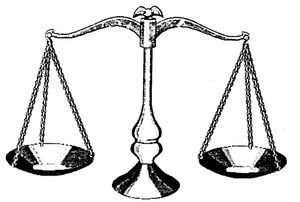False Balance (Fallacy of the Day)
 The fallacy of false balance is based on the assumption that giving “both sides” an equal treatment is the fairest and least biased way to present a controversial account.
The fallacy of false balance is based on the assumption that giving “both sides” an equal treatment is the fairest and least biased way to present a controversial account.
This is often seen in journalism in a “he said, she said” presentation of a story. Spokespeople from “both sides” are quoted, and the journalist leaves it to the reader/viewer to decide where the truth lies.
This is a fallacy when it gives the impression that two sides are equally worthy of consideration even though they in fact are not.
For example, having a quotation from a evolutionary scientist “counterbalanced” by a quotation from a creationist may give the impression that both sides are reasonable and supported by scientific evidence. In fact, however, evolution is a well-supported scientific theory that is accepted by all scientists working in the field, whereas creationism is a form of denialism. Presenting the two as being on equal footing misrepresents the reality of the situation.
Another even more more politically charged example is that of the language used to report on instances of torture committed by the United States. Government officials used euphemisms like “enhanced interrogations” to describe procedures, such as water-boarding, that have long been understood to be instances of torture. (For example, a water board is included in the display of torture devices at the Tuol Sleng Genocide Museum. See images here.)
Most journalists avoided using the term “torture” when speaking of water-boarding performed by U.S. intelligence agents because they decided that using the term would amount to taking a “side” in a political “debate” and journalists should avoid this in their reporting.
For example, the NPR ombudsman argued,
[T]he role of a news organization is not to choose sides in this or any debate. People have different definitions of torture and different feelings about what constitutes torture. NPR’s job is to give listeners all perspectives, and present the news as detailed as possible and put it in context.
The vast majority of NPR’s listeners disagreed however. They argued that “torture” means torture, and that the mere fact that a president and his lawyers asserted that water-boarding wasn’t torture didn’t make it so.
Treating a politically motivated redefinition as a “side” in a legitimate “debate” is an example of how an attempt at balance can prevent the fair presentation of facts.
Update: Nice discussion of the problems with “teaching the controversy” in a pdf (pp. 25-29) found here.
One Response so far
df
December 5th, 2023
10:59 pm
Hi,
who decides what is reliable? Who decides, that evolution is above creationism.
Let’s say, you do.
Do you think, people will then go and believe you more.
No they will get their alternative facts from somewhere else.
This so called “False Balance Fallacy” is literally “I do not like your opionion, so I will not platform it.”
It’s okay, if you don’t, but please don’t say: “We are objective. We are fair”.
No, you aren’t. You are biased and let people know, what kind of bias you have. Left wing, right wing, climate accepter, climate denier or whatever.
Leave a comment